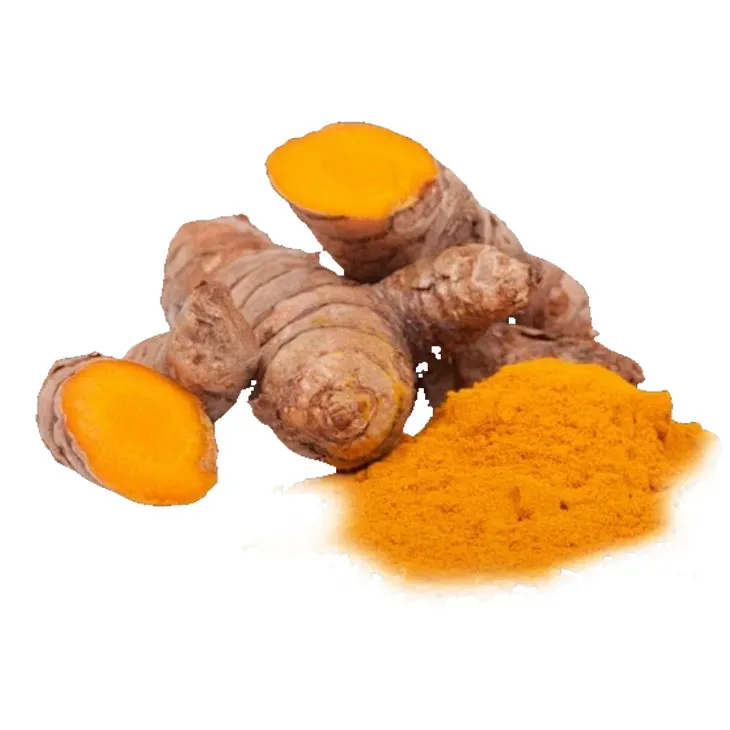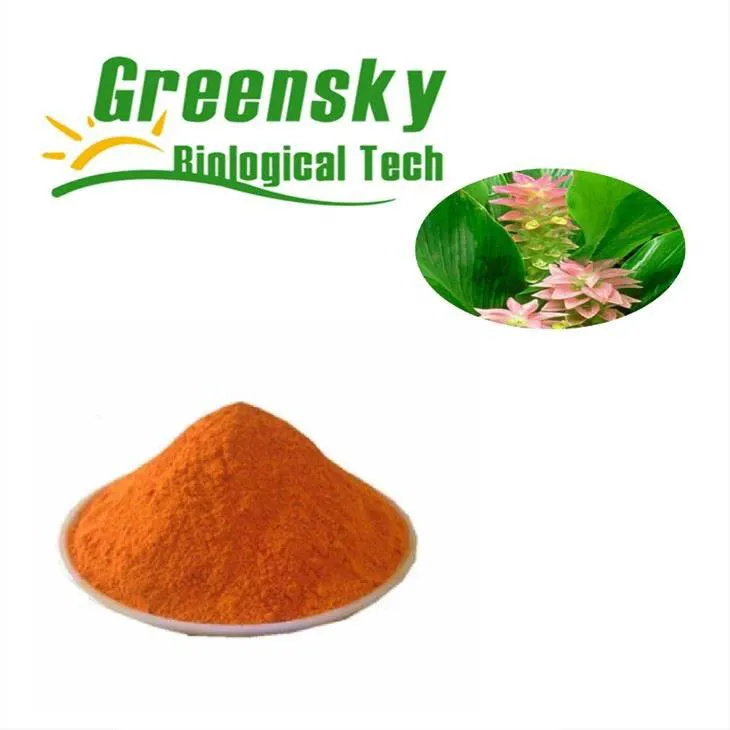- 0086-571-85302990
- sales@greenskybio.com
Six Astonishing Benefits of Curcumin for Achieving Perfect Skin!
2024-11-13

1. Introduction to Curcumin
Curcumin is a natural compound that is derived from the turmeric plant. It has been used for centuries in traditional medicine, particularly in Asian cultures. Turmeric, the source of Curcumin, is a bright yellow spice that is commonly used in cooking. However, its benefits extend far beyond the kitchen, especially when it comes to skin health.

2. Fighting Free Radicals
What are free radicals? Free radicals are unstable molecules that are formed in the body due to various factors such as environmental pollutants, UV radiation, and poor diet. These molecules have an unpaired electron, which makes them highly reactive. How do free radicals affect the skin? They can cause oxidative stress in the skin cells. This oxidative stress can lead to premature aging, wrinkles, and dull skin.
Curcumin as an antioxidant. Curcumin has powerful antioxidant properties. It can neutralize free radicals in the skin, preventing them from causing damage. By doing so, it helps to maintain the skin's natural health and beauty. Studies have shown that curcumin can scavenge free radicals more effectively than some other common antioxidants. This ability to fight free radicals is one of the key reasons why curcumin is beneficial for the skin.

3. Promoting Collagen Production
Collagen and skin health. Collagen is a protein that is essential for maintaining the structure and elasticity of the skin. As we age, the production of collagen in our bodies decreases. This leads to sagging skin, wrinkles, and a loss of firmness.
How curcumin promotes collagen. Curcumin can stimulate the production of collagen in the skin. It does this by activating certain cells in the skin called fibroblasts. Fibroblasts are responsible for synthesizing collagen. By promoting collagen production, curcumin helps to keep the skin firm, plump, and youthful - looking.

4. Skin Rejuvenation
Cell turnover. The skin is constantly renewing itself through a process called cell turnover. Old skin cells are shed, and new ones are generated. However, as we age, this process slows down.
Curcumin's role in rejuvenation. Curcumin can enhance the process of cell turnover in the skin. It helps to exfoliate the skin gently, removing dead skin cells and revealing fresher, younger - looking skin underneath. Additionally, curcumin can improve the skin's texture, making it smoother and more radiant.

5. Treating Skin Disorders
Acne
- Acne is a common skin disorder that affects many people, especially during adolescence. It is caused by a combination of factors such as hormonal changes, excess sebum production, and bacterial infections.
- Curcumin has antibacterial properties that can help to fight the bacteria that contribute to acne. It can also reduce inflammation associated with acne, helping to soothe redness and swelling.
Eczema
- Eczema is a chronic skin condition characterized by itchy, inflamed skin. The exact cause of eczema is not fully understood, but it is believed to be related to an overactive immune system.
- Curcumin can modulate the immune response in the skin, reducing inflammation and providing relief from the symptoms of eczema. It can also help to moisturize the skin, which is important for eczema sufferers as their skin is often dry.
Psoriasis
- Psoriasis is an autoimmune skin disorder that results in the rapid buildup of skin cells, leading to thick, scaly patches on the skin.
- Curcumin can interfere with the abnormal cell growth process in psoriasis. It can also reduce the inflammation associated with this condition, improving the overall appearance and comfort of the skin.

6. Giving the Skin a Natural Glow
Improving blood circulation. Good blood circulation is essential for healthy skin. It ensures that the skin cells receive the necessary nutrients and oxygen. Curcumin can improve blood circulation in the skin, which gives the skin a healthy, rosy glow.
Reducing pigmentation. Uneven skin pigmentation can make the skin look dull and aged. Curcumin can help to reduce pigmentation by inhibiting the production of melanin, the pigment responsible for skin color. This can result in a more even - toned skin, with a natural, healthy glow.
7. How to Incorporate Curcumin into Your Skincare Routine
Topical application
- There are many skincare products available on the market that contain curcumin. These include creams, serums, and masks. When choosing a curcumin - based product, look for one that has a high concentration of curcumin and is free from harmful additives.
- Before applying a new curcumin product to your face, it is advisable to do a patch test on a small area of skin to check for any allergic reactions.
Oral consumption
- You can also consume curcumin orally for skin benefits. Curcumin supplements are available in the form of capsules or tablets. However, it is important to note that curcumin has low bioavailability when taken orally, meaning that not all of it is absorbed by the body.
- To improve the absorption of curcumin, it can be taken with black pepper or a fat - based substance. For example, you can take curcumin with a meal that contains healthy fats.
8. Precautions and Side Effects
While curcumin is generally safe for most people, there are some precautions to keep in mind.
Allergic reactions
- Some people may be allergic to curcumin. Symptoms of an allergic reaction may include itching, redness, or swelling of the skin. If you experience any of these symptoms after using a curcumin - based product, discontinue use immediately.
Interactions with medications
- Curcumin may interact with certain medications. For example, it can increase the risk of bleeding when taken with blood - thinning medications. If you are taking any medications, it is advisable to consult your doctor before starting curcumin supplements.
9. Conclusion
Curcumin is a remarkable compound with numerous benefits for the skin. From fighting free radicals to treating skin disorders, it offers a natural and effective solution for achieving perfect skin. By incorporating curcumin into your skincare routine, either topically or orally, you can take advantage of its amazing properties and enjoy healthy, beautiful skin. However, it is important to be aware of the precautions and potential side effects to ensure safe and effective use.
FAQ:
What is curcumin?
Curcumin is a natural compound found in turmeric. It has antioxidant, anti - inflammatory, and many other beneficial properties that can be great for the skin.
How does curcumin fight free radicals for skin?
Free radicals are unstable molecules that can damage skin cells. Curcumin is a powerful antioxidant. It can neutralize these free radicals, preventing them from causing oxidative stress to the skin. This helps in maintaining the skin's health and appearance.
Can curcumin really promote collagen production?
Yes, curcumin can promote collagen production. Collagen is essential for skin elasticity and firmness. Curcumin stimulates the fibroblasts in the skin, which are the cells responsible for producing collagen, thus helping to keep the skin looking young and smooth.
What skin disorders can curcumin treat?
Curcumin can be effective in treating various skin disorders. For example, it can help with psoriasis and eczema. Its anti - inflammatory properties reduce the inflammation associated with these conditions, soothing the skin and reducing symptoms like redness, itching, and scaling.
How does curcumin give the skin a natural glow?
By fighting free radicals, reducing inflammation, and promoting overall skin health, curcumin helps the skin to function optimally. This results in a more radiant complexion. Also, its ability to improve blood circulation in the skin can contribute to a natural glow.
Related literature
- The Role of Curcumin in Skin Health: A Comprehensive Review"
- "Curcumin and Skin Aging: Mechanisms and Therapeutic Potential"
- "Beneficial Effects of Curcumin on Skin Disorders: Evidence from Clinical Studies"
- ▶ Hesperidin
- ▶ Citrus Bioflavonoids
- ▶ Plant Extract
- ▶ lycopene
- ▶ Diosmin
- ▶ Grape seed extract
- ▶ Sea buckthorn Juice Powder
- ▶ Fruit Juice Powder
- ▶ Hops Extract
- ▶ Artichoke Extract
- ▶ Mushroom extract
- ▶ Astaxanthin
- ▶ Green Tea Extract
- ▶ Curcumin
- ▶ Horse Chestnut Extract
- ▶ Other Product
- ▶ Boswellia Serrata Extract
- ▶ Resveratrol
- ▶ Marigold Extract
- ▶ Grape Leaf Extract
- ▶ New Product
- ▶ Aminolevulinic acid
- ▶ Cranberry Extract
- ▶ Red Yeast Rice
- ▶ Red Wine Extract
-
Coix Seed Extract
2024-11-13
-
Epimedium extract powder
2024-11-13
-
Cocoa Extract
2024-11-13
-
melatonin extract
2024-11-13
-
Peppermint Extract Powder
2024-11-13
-
Andrographis Paniculata Extract Powder
2024-11-13
-
Cranberry Extract
2024-11-13
-
Diosmin
2024-11-13
-
Coconut Water Powder
2024-11-13
-
Tamarind extract powder
2024-11-13





















